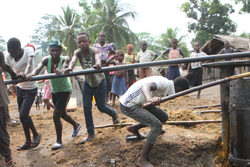Mongabay | 14 October 2021
by Mike Gaworecki
Christian-Geraud Neema Byamungu, a Congolese researcher who focuses on natural resource governance, tells us about how the growing demand for cobalt to make electric-car batteries has led to increased mining in the DRC, the Chinese companies that dominate the mining sector in the DRC, and why the contracts between those companies and the country are being called into question.
Podcast: Who benefits from resource extraction in DRC?
by Mike Gaworecki
On today’s episode of the Mongabay Newscast, we look at two stories that illustrate how resource extraction is impacting human rights and the environment in the Democratic Republic of Congo.
Anuradha Mittal, executive director of the Oakland Institute, tells us about the Western investors profiting off of oil palm plantations accused of human rights violations and environmental abuses.
Christian-Geraud Neema Byamungu, a Congolese researcher who focuses on natural resource governance, tells us about how the growing demand for cobalt to make electric-car batteries has led to increased mining in the DRC, the Chinese companies that dominate the mining sector in the DRC, and why the contracts between those companies and the country are being called into question.
Today we’re looking at the ways resource extraction is impacting the people and the environment in one of the world’s most important tropical forest nations, the Democratic Republic of Congo.
Listen here: https://news.mongabay.com/2021/10/podcast-who-benefits-from-resource-extraction-in-drc/
The Democratic Republic of Congo (DRC) is home to 60% of the Congo Rainforest, the second-largest tropical forest in the world after the Amazon. The DRC is also extremely rich in natural resources, but thanks to political instability and corruption, plus centuries of commercial and colonial resource extraction, those natural resources have not led to widespread prosperity for the people of the DRC.
Today we look at two stories of resource extraction in the DRC, and who is benefiting from those extractive industries. Our first guest is Anuradha Mittal, executive director of the Oakland Institute, a California-based policy think tank that recently released a report on the investors behind controversial oil palm plantation operations in the DRC. Mittal tells us about the report’s main findings, the human rights and environmental abuses these oil palm plantations are responsible for, and whether or not the palm oil companies’ promises of funding economic development projects in local communities has actually occurred.
We also speak with Christian-Geraud Neema Byamungu, a Congolese researcher who focuses on natural resource governance. He tells us about how the growing demand for cobalt to make electric-car batteries has led to increased mining in the DRC, which has such vast reserves of the element it’s known as “the Saudi Arabia of cobalt.” Byamungu also tells us about the Chinese companies that dominate the mining sector in the DRC, and why the contracts between those companies and the country are being called into question.
Further reading:
• ”As energy needs drive demand for minerals, forests face greater threats” (11 November 2020)
• ”Pension and endowment funds linked to conflict-plagued oil palm in DRC” (22 March 2021)














